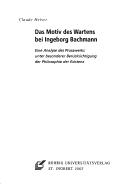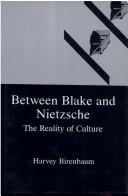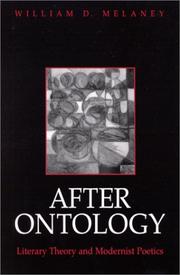| Listing 1 - 10 of 19 | << page >> |
Sort by
|
Book
ISBN: 9171913092 Year: 1997 Publisher: Umeå : Umeå university,
Abstract | Keywords | Export | Availability | Bookmark
 Loading...
Loading...Choose an application
- Reference Manager
- EndNote
- RefWorks (Direct export to RefWorks)
Book
ISBN: 5892095770 Year: 2000 Publisher: Moskva : Dialog-MGU,
Abstract | Keywords | Export | Availability | Bookmark
 Loading...
Loading...Choose an application
- Reference Manager
- EndNote
- RefWorks (Direct export to RefWorks)
Book
ISBN: 9783825312893 3825312895 Year: 2001 Publisher: Heidelberg: Winter,
Abstract | Keywords | Export | Availability | Bookmark
 Loading...
Loading...Choose an application
- Reference Manager
- EndNote
- RefWorks (Direct export to RefWorks)
Postmodernism (Literature) --- American literature --- Ontology in literature. --- Motion pictures --- Postmodernism

ISBN: 3861104261 9783861104261 9783861104261 Year: 2007 Publisher: St. Ingbert : Röhrig,
Abstract | Keywords | Export | Availability | Bookmark
 Loading...
Loading...Choose an application
- Reference Manager
- EndNote
- RefWorks (Direct export to RefWorks)
Ontology in literature.
---
Ontology in literature.
---
Prosa.
---
Waiting (Philosophy).
---
Waiting (Philosophy).
---
Warten
Book
ISBN: 1443891959 9781443891950 1443890111 9781443890113 Year: 2016 Publisher: Newcastle upon Tyne Cambridge Scholars Publishing
Abstract | Keywords | Export | Availability | Bookmark
 Loading...
Loading...Choose an application
- Reference Manager
- EndNote
- RefWorks (Direct export to RefWorks)
Doris Lessing is a writer for all times; she is a historiographer and a transnational translational mediator between the East and the West. This volume provides a collection of articles analysing Doris Lessing's literature. The first part, entitled "Lessing's World of Words", offers a broad vision of the writer's novels; it introduces her many genres and sheds light on her literary affiliations. This is followed by "Lessing's Other Spaces", which dives into the novelist's imaginary and spiritual universes. The final part, "Intersections: Lessing and Other Writers" establishes an analogy betwee
Ontology in literature. --- Time in literature. --- Lessing, Doris, --- Lessing, Doris --- Criticism and interpretation.
Book
ISBN: 8490962642 8415636547 8415636555 Year: 2014 Publisher: Madrid : Casa de Velázquez,
Abstract | Keywords | Export | Availability | Bookmark
 Loading...
Loading...Choose an application
- Reference Manager
- EndNote
- RefWorks (Direct export to RefWorks)
La poésie d’Ausiàs March est un univers poétique sombre. Écrite à la première personne, elle est habitée par un moi qui, tel un nouvel Adam, s’est révolté contre son Créateur en lui préférant sa dame et l’amour tout charnel qu’il lui porte. Par ce nouveau péché originel, le moi devient « amador » : son être en est profondément modifié, et il mérite le châtiment de ceux qui osent contre- venir à l’ordre divin. Déchu de son humanité, il se sait condamné. Pourtant, chez lui, dans un mouvement d’orgueil stupéfiant, le châtiment sera auto-dispensé et auto-imposé : l’être marchien sera exclu du monde des hommes et ne trouvera plus d’existence que par sa parole, douloureusement lucide et puissante, obsessionnelle et exclusive. La poésie marchienne se révèle ainsi comme le seul lieu d’existence possible pour un moi à l’orgueil hyperbolique, capable par son cri poétique de dresser à travers les siècles, pour l’éternité, son être d’« amador ». Ausiàs March, el poeta más importante en lengua catalana del siglo XV, nos ha legado una obra inmensa cuya aparente heterogeneidad se resuelve en una exploración incesante de la naturaleza humana. La grandeza de su poesía, de una belleza ruda y violenta, consiste en haber mostrado, mediante imágenes sombrías y poderosas, las fallas y las insuficiencias de la antropología medieval y en haber sabido aportar, con esos mismos procedimientos poéticos, una respuesta no teórica sino poética, de una potencia sin igual.
Catalan poetry --- Ontology in literature. --- March, Ausiàs, --- Criticism and interpretation. --- March, Auzias, --- Marc, Ausiàs,

ISBN: 0838752225 Year: 1992 Publisher: Lewisburg Bucknell university press
Abstract | Keywords | Export | Availability | Bookmark
 Loading...
Loading...Choose an application
- Reference Manager
- EndNote
- RefWorks (Direct export to RefWorks)
Culture in literature --- Ontology in literature --- Blake, William, --- Nietzsche, Friedrich Wilhelm --- Philosophy.
Book
ISBN: 080477336X 9780804773362 9780804762076 9780804762083 Year: 2009 Publisher: Stanford, Calif. Stanford University Press
Abstract | Keywords | Export | Availability | Bookmark
 Loading...
Loading...Choose an application
- Reference Manager
- EndNote
- RefWorks (Direct export to RefWorks)
What is a woman? What is a man? How do they—and how should they—relate to each other? Does our yearning for "wholeness" refer to something real, and if there is a Whole, what is it, and why do we feel so estranged from it? For centuries now, art and literature have increasingly valorized uniqueness and self-sufficiency. The theoreticians who loom so large within contemporary thought also privilege difference over similarity. Silverman reminds us that this is but half the story, and a dangerous half at that, for if we are all individuals, we are doomed to be rivals and enemies. A much older story, one that prevailed through the early modern era, held that likeness or resemblance was what organized the universe, and that everything emerges out of the same flesh. Silverman shows that analogy, so discredited by much of twentieth-century thought, offers a much more promising view of human relations. In the West, the emblematic story of turning away is that of Orpheus and Eurydice, and the heroes of Silverman's sweeping new reading of nineteenth- and twentieth-century culture, the modern heirs to the old, analogical view of the world, also gravitate to this myth. They embrace the correspondences that bind Orpheus to Eurydice and acknowledge their kinship with others past and present. The first half of this book assembles a cast of characters not usually brought together: Friedrich Nietzsche, Sigmund Freud, Marcel Proust, Lou-Andréas Salomé, Romain Rolland, Rainer Maria Rilke, Wilhelm Jensen, and Paula Modersohn-Becker. The second half is devoted to three contemporary artists, whose works we see in a moving new light:Terrence Malick, James Coleman, and Gerhard Richter.
Analogy in literature. --- Resemblance (Philosophy) in literature. --- Ontology in literature. --- Art, Modern --- Philosophy. --- Orpheus --- In literature. --- Analogy in literature --- Ontology in literature --- Orpheus (Greek mythology) in literature --- Resemblance (Philosophy) in literature --- Philosophy --- Orpheus (Greek mythology) in literature.

ISBN: 0791449580 Year: 2001 Publisher: Albany (N.Y.) State University of New York Press
Abstract | Keywords | Export | Availability | Bookmark
 Loading...
Loading...Choose an application
- Reference Manager
- EndNote
- RefWorks (Direct export to RefWorks)
American poetry --- English literature --- Literature --- Modernism (Literature) --- Ontology in literature. --- Poetics --- History and criticism --- Theory, etc. --- History
Book
ISBN: 9781350221888 9781350221840 1350221864 1350221880 9781350221901 9781350221864 Year: 2022 Publisher: London Bloomsbury
Abstract | Keywords | Export | Availability | Bookmark
 Loading...
Loading...Choose an application
- Reference Manager
- EndNote
- RefWorks (Direct export to RefWorks)
Cosmological narratives like the creation story in the book of Genesis or the modern Big Bang are popularly understood to be descriptions of how the universe was created. However, cosmologies also say a great deal more. Indeed, the majority of cosmologies, ancient and modern, explore not simply how the world was made but how humans relate to their surrounding environment and the often thin line which separates humans from gods and animals. Combining approaches from classical studies, anthropology, and philosophy, this book studies three competing cosmologies of the early Greek world: Hesiod's Theogony; the Orphic Derveni theogony; and Protagoras' creation myth in Plato's eponymous dialogue. Although all three cosmologies are part of a single mythic tradition and feature a number of similar events and characters, Olaf Almqvist argues they offer very different answers to an ongoing debate on what it is to be human. Engaging closely with the ontological turn in anthropology and in particular with the work of Philippe Descola, this book outlines three key sets of ontological assumptions - analogism, pantheism, and naturalism - found in early Greek literature and explores how these competing ontological assumptions result in contrasting attitudes to rituals such as prayer and sacrifice.
Cosmology, Ancient --- Creation --- Ancient cosmology --- Mythology --- Greece --- Religion. --- Cosmology, Ancient. --- Mythology. --- Ontology in literature. --- Cosmology in literature.
| Listing 1 - 10 of 19 | << page >> |
Sort by
|

 Search
Search Feedback
Feedback About UniCat
About UniCat  Help
Help News
News